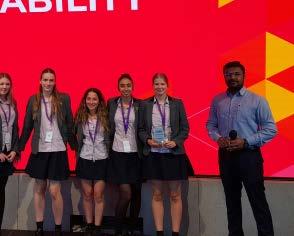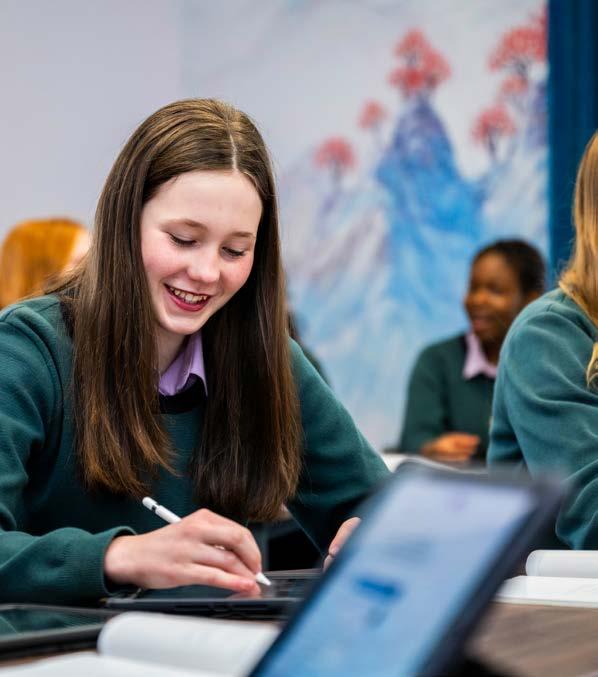
January 2025


January 2025
Dear Year 9 pupil
Taking time to reflect on your academic interests and abilities, and to consider which subjects to study for GCSE, is an important and exciting part in your continuous development as a person! This is your first opportunity to have a real say in what you are studying, and it is a process that will happen again as you near the end of GCSEs and then again in your final year here as you start to apply for the next stage of your studies.
The decisions you are making now will help to shape your future, so you will need to think carefully before making your choices, discussing this with your parents and with school staff. We are here to support you, every step of the way.
As you prepare to select your option subjects, you should think about building upon current successes and also about those areas of learning that you find most enjoyable and worthwhile. In order to ensure that every Farnborough Hill girl is equipped with a good balance of skills and knowledge, certain subjects are compulsory at GCSE level. These subjects constitute what is known as the ‘core curriculum’, which includes English, Mathematics, Science and Religious Education. Alongside these ‘core’ studies, you will choose a number of optional subjects. The decision regarding which of these optional subjects are best for you is an important one, bearing in mind your future ambitions.
I hope that this booklet will provide you with the information you need about the available subjects and that this will help you to make the most beneficial choices as you build your GCSE portfolio. Of course, your time at school is not simply about academic work and qualifications: to get the most out of Farnborough Hill, every pupil should continue to be involved in a wide range of sporting, cultural, spiritual and recreational activities. It is very much the case, however, that a vital part of having a happy and productive school life consists in getting the academic side of life right. Making good choices for GCSE will definitely help you to achieve this.
Please do not hesitate to chat with your Form Tutor, your HoY, Dr Taylor-Warwick or your teachers if you would like to discuss any aspect of our GCSE options process. Whatever your final choices are, you will be in a very good position for your future studies.
With very best wishes for a wonderful GCSE journey – and beyond!
Mrs Maira Young, Headmistress
KEY DATES:
• GCSE Options Evening - Tuesday 21 January 2025
• TOOLS Options programme information sent out - Wednesday 22 January 2025
• Submit Options choices - by Monday 24 February 2025

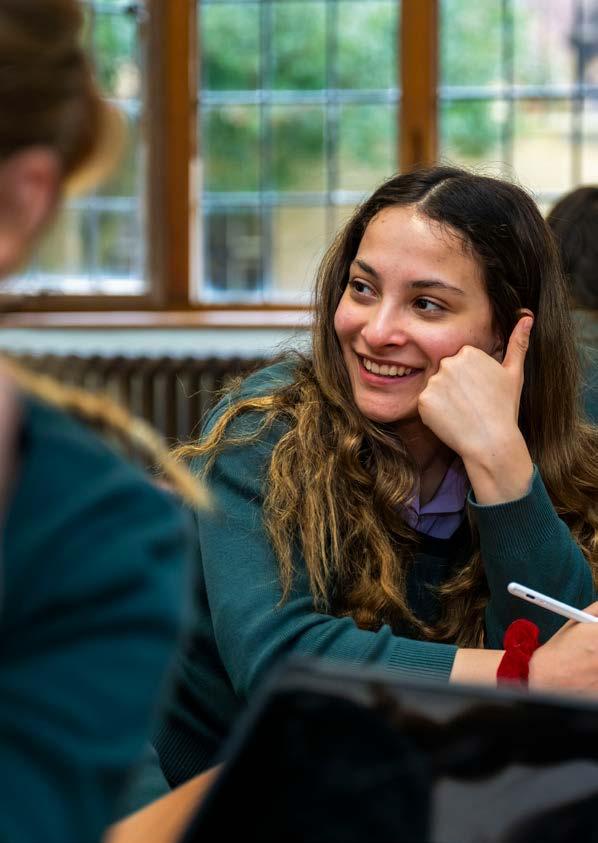
We hope that Year 9 has been inspiring, as you have spent more time studying the subjects that you enjoy as options. It has also been the start of your GCSE journey as either a foundation course or learning the specification in both your core and option subjects.
Next year you will continue with your final GCSE choices. The courses are outlined in this booklet, they are both challenging and interesting. Examinations are taken at the end of Year 11 and you will be awarded a grade 9 - 1 based on your performance in the GCSE examinations and, in the minority of subjects, the Non-Examined Assessment element. The specifications require you to demonstrate a range of skills including the ability to handle information and solve problems, carry out experiments and use investigative skills, plus show evidence of your reading, writing, listening and speaking skills. All of these will be tested in a variety of ways including, according to subject, written examinations, oral work, aural work and the submission of practical work.
During the Spring Term of Year 9, you are invited to make your choices of subjects for the next two years of study leading to the GCSE examinations.
We feel that it is essential that you follow a broad and balanced curriculum. Therefore, you will study a compulsory range of core subjects, to which others are added, chosen from a range of optional subjects.
Core Subjects
• English Language
• English Literature
• Mathematics
• Religious Studies
• Combined Science
Option Subjects
• Classical Civilisation
• Computer Science
• Design, Art and Technology (DART): Art and Design
Design and Technology: Food Preparation and Nutrition Design and Technology: Product Design
• Drama
• French
• Geography
• German
• History
• Latin
• Music
• Physical Education
• Separate Sciences
• Spanish
If you would like a copy of the full specification for any subject, please contact the Head of Department.

You will select option subjects from those studied in Year 9, in which you have a particular interest and ability. It is envisaged that you will study three option subjects. Although we expect all pupils to opt for three option subjects, there may be extenuating circumstances where a reduced curriculum is deemed appropriate. Applications for a reduced curriculum must be made via the Reduced Curriculum Form (on the Parent Portal): https://farnborough-hill.fireflycloud.net/forms/reduced-curriculum-request and in consultation with the Deputy Head - Academic and HoY. Please see page 30 for further details of additional GCSEs offered via our Super-Curriculum programme.
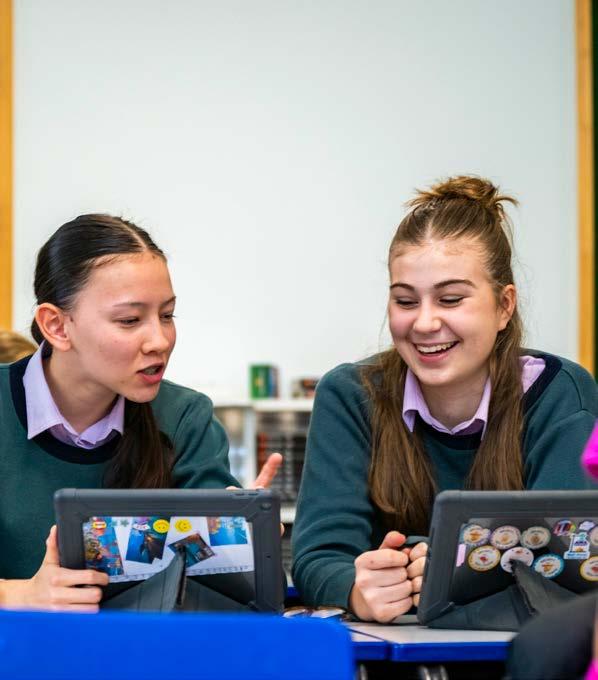
We aim to arrange option subjects on the timetable in such a way as to allow each one of you to follow the subjects of your choice but this may not always be possible, particularly if certain subject combinations, with a low uptake, are selected. In addition to your examination subjects, in Years 10 and 11 you will follow a programme which includes the following:
• Personal, Social, Health and Economic Education (PSHEE)
• Physical Education
• Careers Education
The Year 9 Pupils’ and Parents’ Evening takes place before you select your GCSE options so that your progress and the demands of the various subject specifications can be discussed with the teaching staff. It is expected that you will continue with the study of all your GCSE subjects throughout the two-year course. All GCSE specifications, regardless of the examination board, are designed to meet national standards and Heads of Department have selected courses which provide the best preparation for A level study and are most suited to the needs of their pupils.
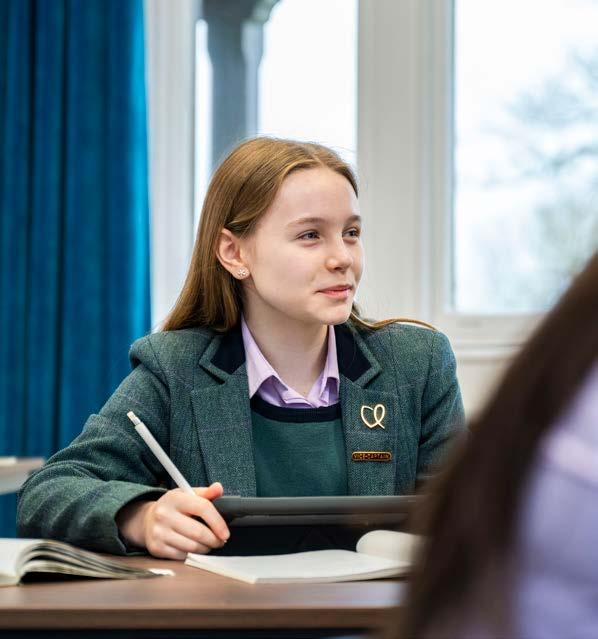
The course we follow at GCSE is governed by the requirements of the AQA English Language specification. The course is aimed both at pupils for whom this will be their last formal association with the study of English, and at those who might wish to pursue their studies to A level and beyond. Teaching methods vary from formal classes, to group discussion, presentations, research lessons, and any other appropriate methods. You will learn to analyse a range of fiction and non-fiction texts, exploring how writers use language effectively. You will also develop your writing skills, with a focus on adapting language for different purposes.
Core Subject: English Language Course Code: 8700
How is it assessed?
• All assessment is carried out through examination. There are two papers, which test written accuracy, reading comprehension and analysis, and the ability to write for a purpose

• Spoken Language: In addition, you will be assessed on a spoken language presentation. Achievement in this area will be recorded as a separate grade on the final GCSE certificate. This component will test your ability in presenting, responding to questions and feedback, and the use of standard English
Description Content
Paper 1: Explorations in creative reading and writing
Reading (40 marks) (25%) – one single text
• 1 short form question (1 x 4 marks)
• 2 longer form questions (2 x 8 marks)
• 1 extended question (1 x 20 marks)
Writing (40 marks) (25%)
• 1 extended writing question (24 marks for content, 16 marks for technical accuracy)
Paper 2: Writers’ viewpoints and perspectives
Non-Examined Assessment (NEA):
Spoken Language
Progression
Reading (40 marks) (25%) – two linked texts
• 1 short form question (1 x 4 marks)
• 2 longer form questions (1 x 8, 1 x 12 marks)
• 1 extended question (1 x 16 marks)
Writing (40 marks) (25%)
• 1 extended writing question (24 marks for content, 16 marks for technical accuracy)
• presenting • responding to questions and feedback
• use of standard English
Teacher set and marked
Separate endorsement 0% weighting of GCSE
Mastering the skills in English Language will enable you to speak, read and write fluently and communicate information and ideas with others. We see GCSE English Language as the key to successful learning, knowledge acquisition and understanding in all subjects. The command of the English language facilitates opportunities in every aspect of life, work, learning and experience. Being literate is at the heart of our creative thinking and development. It widens horizons and opens up a lifetime of opportunities. It should exist not just as a distant aspiration, but as a real and tangible entitlement for all. This GCSE English Language specification is designed to build upon and enable progression from the skills embodied in the English programmes of study in Key Stage 3. The skills in developing language and literacy will be further developed and strengthened with additional stretch and challenge being presented to candidates in terms of content, reading texts and tasks.
You will study a range of texts as part of your GCSE English Literature course. This will allow you to develop knowledge and skills in reading, writing and critical thinking. Through literature, you will have a chance to develop culturally and acquire knowledge of the wider world, while nurturing your enjoyment of reading. In addition to exploring a variety of extracts to overlap with English Language, you will study a Shakespeare play, a 19th-century novel, a selection of poetry and a piece of modern drama or prose. The assessment for this course comprises two closed book examinations.
Core Subject: English Literature
How is it assessed?
• Written examination at the end of Year 11
• Shakespeare: you will study one play from the list of six set texts
• A 19th-century novel: you will study one novel from the list of seven set texts
• Modern texts: you will study one from the list of set texts, which includes post-1914 prose fiction and drama
• Poetry: you will study one cluster of poems taken from the AQA poetry anthology, Poems Past and Present. The poems in each cluster are thematically linked and were written between 1789 and the present day
• You will study all 15 poems in your cluster and be prepared to write about any of them in the examination
• Unseen poetry: in preparing for the unseen poetry section of the examination you will experience a wide range of poetry in order to develop your ability to closely analyse unseen poems. You should be able to analyse and compare key features such as their content, theme, structure and use of language
Description Content Length % of Overall Mark
Paper 1: Shakespeare and the 19thcentury novel
Paper 2:
Modern texts and poetry
Progression
Section A: Shakespeare. You will answer one question on your chosen play. You will be required to write in detail about an extract from the play and then to write about the play as a whole
Section B: The 19th-century novel. You will answer one question on your chosen novel. You will be required to write in detail about an extract from the novel and then to write about the novel as a whole
Section A: Modern texts. You will answer one essay question from a choice of two on your studied modern prose or drama text
Section B: Poetry. You will answer one comparative question on one named poem printed on the paper and one other poem from your chosen anthology cluster
Section C: Unseen poetry. You will answer one question on one unseen poem and one question comparing this poem with a second unseen poem
Progression from Key Stage 3
In the Key Stage 3 programme of study you have been required to read a wide range of fiction and non-fiction including, in particular, whole books, short stories, poems and plays with a wide coverage of genres, historical periods, forms and authors. The range will have included high-quality works from English Literature, both pre-1914 and contemporary, including prose, poetry and drama and Shakespeare (two plays).
This study of such a broad range of texts at Key Stage 3 will have provided you with grounding in the types of texts that you will then study in more detail at GCSE. The level of challenge of the texts selected for study at GCSE, as well the skills rewarded in the mark scheme, are clearly a step up from Key Stage 3.
Progression to A level
AQA have worked closely with the development teams to ensure that the specifications are linked as much as they can be within the regulatory requirements.
The GCSE Mathematics course builds on work covered in Year 9, with an increased focus on:
• applying Mathematics in context
• problem solving
• reasoning
• the functional elements of Mathematics
The broad topics and their relative proportions in the Higher Tier GCSE are as depicted:
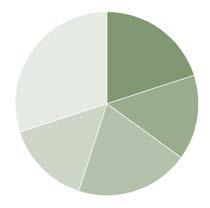
Core Subject: Mathematics
How is it assessed?
Course
• The entire GCSE will be assessed by three examinations sat at the end of the course. There is no coursework and no controlled assessment. Each paper has equal weighting and can examine any content
Progression
The specification will enable you to:
• develop fluent knowledge, skills and understanding of mathematical methods and concepts
• acquire, select and apply mathematical techniques to solve problems
• reason mathematically, make deductions and inferences and draw conclusions
• comprehend, interpret and communicate mathematical information in a variety of forms appropriate to the
and context
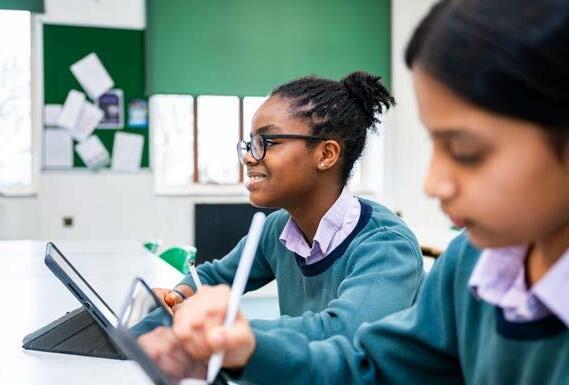
All you need to study this subject is an enquiring and open mind and an ability to argue! This course is accessible to candidates of any religious persuasion or none. Above all, you need to be prepared to be challenged intellectually and to challenge the ideas of others.
Core Subject: Religious Studies Course Code: 8062
How is it assessed?
• Examination at the end of Year 11
• Each religion has a common structure of two five-part questions of 1, 2, 4, 5 and 12 marks.
• Each religion is marked out of 48 (plus 5 marks for spelling, punctuation and grammar (SPaG))
• Each theme has a common structure of one five-part question of 1, 2, 4, 5 and 12 marks
• Each theme is marked out of 24 (plus 5 marks for spelling, punctuation and grammar (SPaG))
Description Content
Paper 1: Study of religions
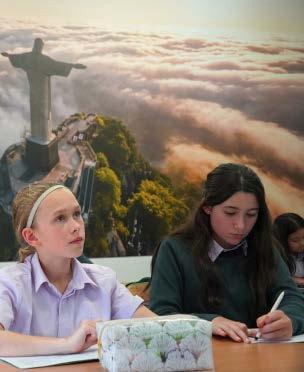
Paper 2: Thematic studies
• Christianity - beliefs, teachings and practices
• Judaism - beliefs, teachings and practices
• Theme A: relationships and families
• Theme B: religion and life
• Theme C: the existence of God and
• revelation
• Theme D: religion, peace and conflict
Progression
GCSE Religious Studies is a good foundation if you would like to study it at A level. This subject enables you to be able to think critically, discuss and evaluate. It particularly prepares you for the following careers: legal and medical services, journalism and publishing, education and social work, the media sector and politics.
This qualification leads to a Double Award Combined Science: Trilogy, equivalent to two GCSEs. The three Sciences, Biology, Chemistry and Physics, will be taught by subject specialists so you will have three Science teachers throughout Years 10 and 11. There is no practical coursework requirement, but you are required to complete set experiments which can be assessed in the written papers.
How is it assessed?
• Six written papers, as follows:
Description Content
Biology Paper 1
Biology Paper 2
Chemistry Paper 1
Chemistry Paper 2
Physics
Paper 1
Physics Paper 2
Progression
Biology topics 1 – 4: Cell Biology; Organisation; Infection and response; Bioenergetics (70 marks)
Biology topics 5 – 7: Homeostasis and response; Inheritance, variation and evolution; Ecology (70 marks)
Chemistry topics 8 – 12: Atomic structure and the periodic table; Bonding, structure, and the properties of matter; Quantitative Chemistry; Chemical changes; Energy changes (70 marks)
Chemistry topics 13 – 17: The rate and extent of chemical change; Organic Chemistry; Chemical analysis; Chemistry of the atmosphere; Using resources (70 marks)
Physics topics 18 – 21: Energy; Electricity; Particle model of matter; Atomic structure (70 marks)
Physics topics 22 – 24: Forces; Waves; Magnetism and electromagnetism (70 marks)
Combined Science is an acceptable qualification for studying A level in any of the Sciences; the A level specifications start from the Combined Science specification. However, if you know you want to take Science at A level, we would recommend you consider Separate Sciences.
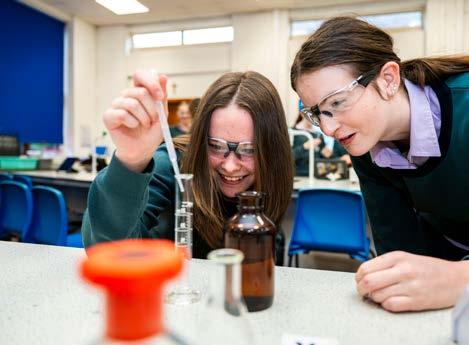
• Do you enjoy working with your own ideas?
• Do you enjoy art, photography, sewing or drawing at home?
• Have you made art that you are pleased with in Year 9?
• Art at GCSE can involve painting and drawing, ceramics, mixed media and textiles. Photography can also be explored further as part of the above.
• Visiting artist and trips to exhibitions, bi-annual international trips
• At the beginning of Year 10, pupils will be issued with an art pack with a range of media to use in their sketchbooks
How is it assessed?
• Unit 1 Personal Portfolio (60%): builds up and is assessed throughout Year 10 and until January of Year 11
• Unit 2 Externally set assignment (40%): is set by AQA and starts January of Year 11 until the end of the course when you will do a 10-hour-long practical examination, held over two days
Description Content
Unit 1:
Personal Portfolio
Art and Design GCSE is 100% practical. Pupils may choose to do:
• Option 1: Painting and Drawing
• Option 2: Textiles and Mixed
• Option 3: Ceramics
You will be taught how to work in a personal and individual way towards the assessment criteria for Art and Design. These criteria include drawing, experimentation, looking at artists’ work to produce your own personal outcomes in whichever specialisms you choose
Unit 2: Externally set assignment You choose to focus on either Painting and Drawing, Ceramics or Textiles at the end of Year 9. You will have a new sketchbook to work in. Your practical outcome will be produced over a period of 10 hours, spread over two days, and in examination conditions. It will be marked according to the assessment criteria outlined above
1 term for prep work and 10 hours in controlled conditions
Fashion designer, textile designer, advertising for film and TV, illustrator, product designer, architect, book illustrator, website designer, graphic designer, artist, sculptor, ceramicist, beauty therapy and theatrical make-up artist, interior designer, costume or stage set designer, museum or gallery work, art teacher, jewellery designer and maker, photographer, archaeology, media studies, animation and game design. Having a creative subject shows an ability to be creative and think outside the box. This ability is very desirable for scientific and engineering universities.

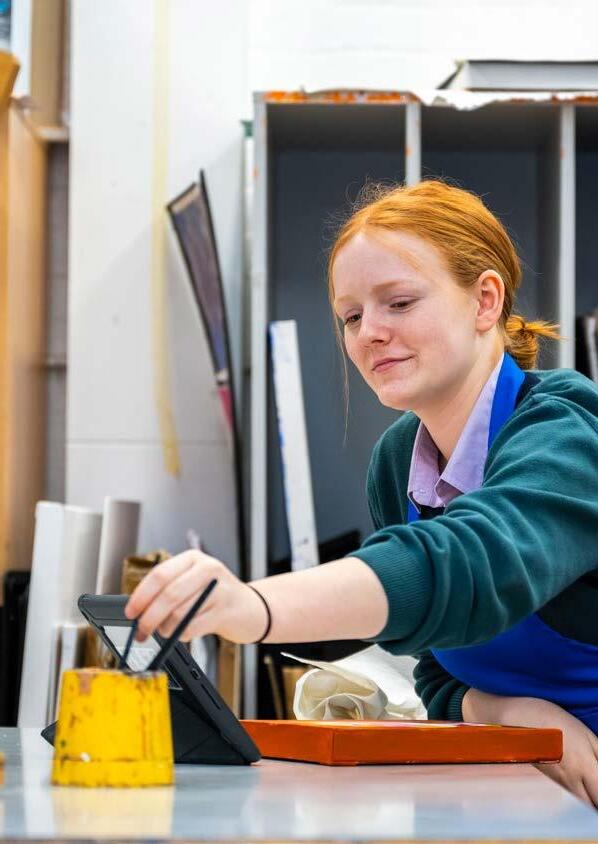
If pupils have a passion and a creative flair for practical cookery and a keen interest in the scientific principles behind food, nutrition and health in a contemporary, changing and multi-cultural society, they may be interested in continuing their interests. The course comprises of seven modules:
• Food preparation skills
• Food nutrition and health
• Food science
• Food safety
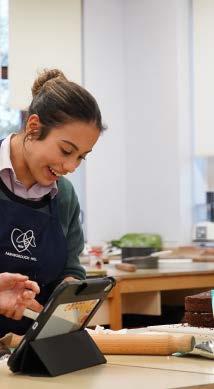
• Food choice
• Food provenance
• Food preparation and cooking techniques
How is it assessed?
• Written examination at the end of Year 11 (50%)
• NEA Assessment in Year 11 (50%). The NEA assessment comprises of two tasks
Description Content
Paper 1
Non-Examined Assessment (NEA) Task 1
Non-Examined Assessment (NEA) Task 2
Food Preparation and Nutrition
• Written examination
Food Investigation task:
• Research
• Practical investigations
• Analysis and evaluation
• Written report of between 1,500 and 2,000 words
• Photographic evidence
Food Preparation task:
• Research
• Technical skills
• Planning
• Practical
• Analyse and Evaluate
• A concise portfolio not exceeding 20 A4 sides or equivalent
• Annotated photographic evidence
including a 3 hour practical assessment
You will find this course relevant if you want to study Medicine, Nutrition, veterinary studies or Sports science. You will also find this course useful if you want complete A levels in Biology or Chemistry, a Level 4 course in Food science and Nutrition, NVQ in Hospitality and Catering or, any access course for any of the above-named courses.
It is key that you enjoy designing, creating and making products. You also need to be able to problem solve and enjoy the process of developing a design through analysing it as it progresses. There is theory as well as Mathematics and Science to support the technical side of understanding the process. We look at the history of design as well as the work of contemporary designers. There will be opportunities for you to take part in trips to inspiring events and exhibitions, at places such as the V&A, the Design Museum and The New Designers Exhibition. There is also the chance to get involved with external professional scholarships, such as the Arkwright Scholarship, and experiences.
How is it assessed?
• 50% Non-Examined Assessment
• 50% Examination
Description Content
Non-Examined Assessment (NEA)
Paper 1
Progression
Evidence: written or electronic design portfolio with photographic evidence of final prototype(s). Approximately 20 pages of A3 or equivalent A4. Pupils are encouraged to create original designs based on independent research. They must make a final product to solve the needs of a client.
Sample contextual challenges: Keeping fit and active, playing games and studying or working from home.
Section A: core technical principles (20%).
• Multiple choice questions and full written answers on a wide range of Design and Technology electronics, Textiles and Resistant Materials
Section B: specialist technical principles (30%).
• Longer question requiring written and drawn answers about the specific area of Design and Technology you are studying ie Resistant Materials
Section C: designing and making principles (50%).
• More detailed questions requiring written and drawn answers about aspects of designing and making in Design and Technology
This course prepares you to continue on to study Product Design at A level. Beyond A level, pupils use this qualification to study engineering, product design, graphic design, industrial design, architecture, theatre design or other similar career paths. It offers a real mix between the academic, technical, theory-based subjects and the creative opportunities of designing and making.

Do you enjoy the Greek myths and legends? Do you enjoy Ancient History and want to learn more? Would you like to find out more about Greek and Roman society and literature? Do you have good reading and writing skills? Do you enjoy trips abroad, to the theatre and museums? If so, this subject is definitely for you!
Progression
Your study of Classical Civilisation will open up many opportunities for you at A level and beyond. Pupils have gone to top universities, including Oxbridge, to continue with their study of this area. Careers for classicists vary from law, journalism and publishing to politics, teaching and archaeology, amongst others.
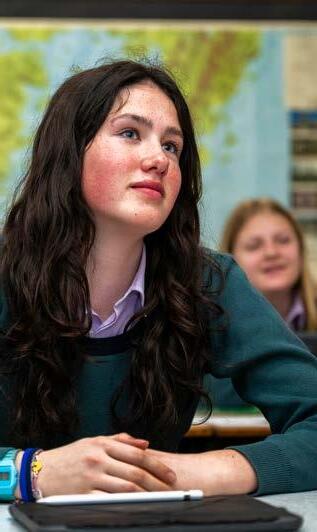
Do you enjoy an intellectual challenge? Would you like to develop your analytical and English language skills? Are you interested in reading Classical literature, in both translation and the original language? Would you like to find out more about Ancient Roman society and mythology? Do you enjoy making connections with language and literature in other subjects, particularly Modern Foreign Languages? If so, this is the subject for you. If you have enjoyed your study of Latin in Year 9, then you will enjoy Latin GCSE.
Progression
Your study of Latin will open up many opportunities for you at A level and beyond. Pupils have gone to top universities, including Oxbridge, to continue with their study of this area. Careers for classicists vary from law, journalism and publishing to politics, teaching and archaeology, amongst others.
Option Subject: Classical Civilisation
How is it assessed?
• Examination at the end of Year 11 Description Content
Paper 1:
J199/11
Thematic Study
Course Code: J199
Paper 2:
J199/22
Literature and Culture
Myths and Religion:
• The gods
• Hercules
• Temples
• Foundation stories
• Festivals
• Myths and symbols of power
• Death and burial
• Journeying to the underworld
Roman City Life:
• Roman housing
• Roman home and family
• Roman society
• Leisure and entertainment
• Satire and fiction
• Pliny and his letters
• Experiencing Roman city life
• Relationships and Roman society
Option Subject: Latin Course Code: J282
How is it assessed?
• Examination at the end of Year 11
Description Content
Paper 1:
J282/01
Paper 2:
J282/05
Paper 3:
J282/06
Language:
Pupils study texts and stories in Latin to build knowledge and understanding of Latin vocabulary, accidence and syntax
Verse Literature:
Pupils study Latin set texts and answer questions in English on aspects of content and analyse, evaluate and respond to the ancient literature they have studied. You may well study extracts from Virgil’s Aeneid.
Literature and Culture:
Pupils study two topics on Roman Civilisation and Culture using sources and answer questions in English on aspects of content, culture, social practices and values. The topics are likely to be Romans in Britain and Myth and Beliefs.
You need to have a curiosity about the world around you:
• How was the world formed?
• Will we be able to survive climate change?
• Why are some countries poorer than others?
• How has the UK been shaped by rivers and the sea?
• What are the issues surrounding over population? In addition, you also need to have good literacy and numeracy skills. Please speak to a member of the Geography Department to gain an insight into the topics and teaching for Geography.
How is it assessed?
• Examination at the end of Year 11
• There are two compulsory days fieldwork which need to be attended in order to fulfil the requirements of the specification and will be examined in Paper 3. The approximate cost is £40
Description Content
Paper 1
Physical Geography:
• The Challenge of Natural Hazards
• The Living World : Tropical Rainforests and Cold Environments
• Physical Landscapes in the UK: Coasts and Rivers
Paper 2 Human Geography
• Urban Issues and Challenges
• The Changing Economic World
• The Challenge of Resource Management: Food
Paper 3
Progression
Applications
Fieldwork
Issue evaluation
A GCSE in Geography will prepare you for life in the wider world, aiding your understanding of how the world works and providing you with a wide range of transferable skills vital for any workplace. Geography can lead you to a variety of careers including: business, the environment, teaching, law or sustainable management. Geography can truly take you anywhere.
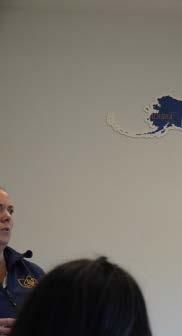
You should study History if you wish to learn how and why the world and its people came to be as they are today. Historians are often asked what is the use and relevance of studying History? Why on earth does it matter what happened long ago? The answer is that History is inescapable. History is the study of the past and the legacies of the past in the present. It connects things through time and encourages its pupils to take a long view of such connections. If you want to study IGCSE History – you need to be interested. Interested in people, events and other countries and asking why? You need good reading and writing skills and a critical eye with which to consider historical sources.
Option
How is it assessed?
• Two written examinations at the end of Year 11
Description Content
Paper 1: Depth Study
Paper 2: Breadth Study
Progression

• A world divided: superpower relations, 1943 - 1972
• A divided union: civil rights in the USA, 1945 - 1974
• The Vietnam Conflict, 1945 - 1975
• Changes in medicine, c1848 - c1948
In addition to preparing you for A level History, an IGCSE in History will open up a wide range of opportunities from law to advertising and publishing via journalism, politics, teaching and archaeology. IGCSE History also aids the development of a range of transferable skills which enable you to face the demands of further and higher education, as well as the demands of the workplace.
We will be visiting Washington DC in the Easter of 2026 to support the IGCSE Civil Rights course. We will then be looking to visit Berlin in the Easter of 2028 to explore sites we will be learning about in the Superpowers course.
The specification covers three distinct themes and these themes apply to all four question papers. You are expected to understand and provide information and opinions about these themes.
Theme 1: People and lifestyle
Theme 2: Popular Culture
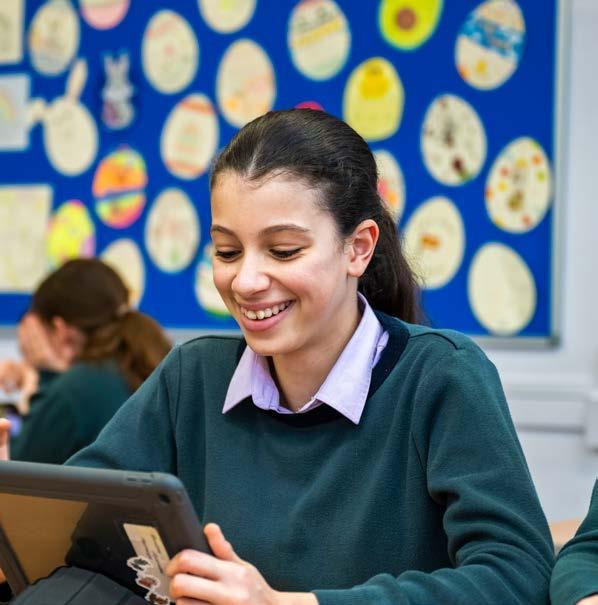
Theme 3: Communication and the world around us
Studying a language at GCSE builds on what you have already learnt in previous years. Language lessons will still be fun and by taking French, German or Spanish GCSE you do not just learn the language, but you get to find out about other people and other countries and cultures, so languages really are interesting and varied subject.s
Option Subject:
French Course Code: 8652
German Course Code: 8662
Spanish Course Code: 8692
How is it assessed?
• Each language has a Foundation Tier (grades 1 - 5) and a Higher Tier (grades 4 - 9)
• You will take all four question papers at the same tier at the end of Year 11
Description
Paper 1: Listening
Paper 2: Speaking
Progression
Are you thinking of a career in which the knowledge of another language will be important or beneficial? When you learn a language at GCSE and beyond, you acquire a range of skills that will enable you to seize the opportunity to work with international companies at home or abroad. There are opportunities for linguists in many fields such as broadcasting, advertising, publishing, teaching, commerce and the travel business. Many universities offering degrees in Medicine like candidates to have a wide range of subjects; a second language is considered an excellent complement. It is also worth remembering that many universities offer courses combining languages with other subjects, such as law or business studies.
Pupils need to have a genuine passion and interest in how to make drama and live theatre. You will need good reading and writing skills and will need to have a critical eye to help you evaluate your own skills and those of others.
The GCSE Drama course has been designed to be practical, engaging and creative. It provides opportunities to understand and create drama as a practical art form where ideas and meaning are communicated to an audience through informed artistic choices. The main purpose is to allow you to study drama in an academic setting whilst also learning to apply knowledge and understanding to the process of creating and developing drama in your own performance work. Drama develops your transferable skills which are desired in higher education and by employers in all sectors of the industry.
Progression
In addition to preparing pupils for A level Drama, a GCSE in Drama will improve their ability to work under pressure and meet deadlines. Pupils will improve their negotiating skills and powers of analysis when evaluating their own work and that of others. It will open up a world of fun and enjoyment, whilst also enriching their own world of imagination through professionally run theatre.
This subject is ideally suited to pupils with a love of music of any sort and those who are interested in the performance, composition and history of the art. An ability to play an instrument, or to sing, is required for the Performing component.
Progression
Aside from providing the foundation for A level Music and/or Music Technology, this course cultivates a number of highly desirable transferable skills, many of which are prized by universities and employers alike. These include skills in listening, analysis and essay writing as well as teamwork, confidence and creativity.
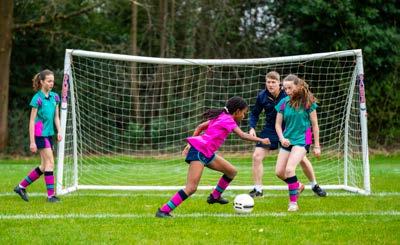
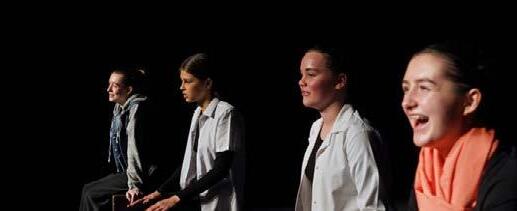
How is it assessed?
• Examination at the end of Year 11
• Two assessed performances
Devising Drama Pupils will explore a stimulus and work with others to create and perform an original piece of drama
Pupils will produce and submit a Portfolio alongside their practical work
Performing Texts Pupils will perform and act with others, to an external examiner, a showcase which will include two extracts from a play script
Examination ‘Performance and Responses’
Pupils will explore a performance text set by OCR (Blood Brothers – Willy Russell) and develop their understanding and knowledge of drama
Pupils will also evaluate a live theatre performance
How is it assessed?
• Non-Examined Assessment in Performing and Composition
• One written examination at the end of Year 11
Component 1: Understanding Music Examination paper with listening exercises and written questions based on music drawn from four Areas of Study
• Western Classical Tradition, 1650-1910
• Popular Music
• Traditional Music
• Western Classical Tradition since 1910
Component 2: Performing Music
Component 3: Composing Music
You must record two separate performances, one as a soloist and one as part of an ensemble
Completion of two compositions, one to a brief set by the examination board and one that is free. You would use Sibelius to complete and create a sound recording of your work
Study over Spring and Summer Terms
performances totalling a minimum of four minutes of music
a minimum of three minutes of music
To succeed in Computer Science you must enjoy puzzles and problem solving. Those with strong mathematical skills will usually be at an advantage, although this is not always the case. Computer Science requires a logical mind and a methodical approach to solving problems.
If you have enjoyed studying Computing in the Lower School and have particularly enjoyed and excelled at topics such as Python Programming and Binary numbers then you have a strong foundation to build upon and do well.
Option Subject: Computer Science
How is it assessed?
Course Code: J227
• GCSE Computer Science is assessed by two theory papers which include both long and short answer questions. Paper 2 (Computational thinking, algorithms and programming) includes questions which assess pupils’ ability to write or refine algorithms
Description Content
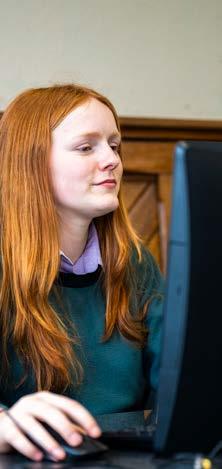
Computer Systems
• Systems architecture
• Memory and storage
• Computer networks, connections and protocols
• Network security
• Systems software
• Ethical, legal, cultural and environmental impacts of technology
Computational
Thinking, Algorithms and Programming
Examination ‘Performance and Responses’
Progression
• Algorithms
• Programming techniques
• Producing robust programs
• Boolean logic
• Programming languages and Integrated Development Environments
All pupils will be given the opportunity to undertake an extended programming project during their course of study. Pupils may draw on some of the content in both components above when engaged in this task
This course will enable you to develop an excellent understanding of how computers work, high level problem solving skills and the ability to write computer programs. The course is structured to provide a firm foundation for studying Computer Science at A level and beyond. It also strongly complements Science and Engineering based degrees.
The most important thing is that you are interested in sport and physical activity. The GCSE specification is varied and covers many different aspects of sport and sporting performance. It will give you an understanding of the benefits of exercise to health, fitness and wellbeing. The course includes theory (60% of the course) and practical work (40% of the course) and it is vital that you compete in sport either inside of school or at an outside club. You will:
• develop theoretical knowledge and understanding of factors that underpin physical activity and sport, and use this knowledge to improve performance
• understand how physiological and psychological states and key socio-cultural influences can affect participation and involvement in physical activity and sport
• develop the ability to analyse and evaluate to improve sporting performance
Option Subject: Physical Education
How is it assessed?
• Examination at the end of Year 11
Course Code: 8582
• NEA: three practical sports and analysis and evaluation of performance (written or oral)
Description Content Length
Paper 1
Paper 2
Non-Examined Assessment (NEA)
Progression
The human body and movement in physical activity and sport:
• Applied anatomy and physiology
• Movement analysis
• Physical training
• Use of data 1 hour 15 minutes
Socio-cultural influences and wellbeing in physical activity and sport:
• Sports psychology
• Socio-cultural influences
• Health, fitness and wellbeing
• Use of data 1 hour 15 minutes
Practical performance in physical activity and sport:
• Practical performance in three different physical activities in the role of player/performer (one in a team activity, one in an individual activity and a third in either a team or individual activity)
• Analysis and evaluation of performance to bring about improvement in one activity
Assessed by teachers and moderated by AQA
This is an exciting opportunity for you to develop your level of skill, knowledge and understanding of theoretical and practical aspects of sport and physical activity. GCSE PE complements many other GCSE subjects, particularly the Sciences, and offers an ideal stepping stone to the A level PE course in the Sixth Form. PE is a useful subject to take if you are thinking about a career in any of the following: sport science, PE teaching, physiotherapist, professional sports person, sports coach/consultant, diet and fitness instructor, personal trainer and many more.
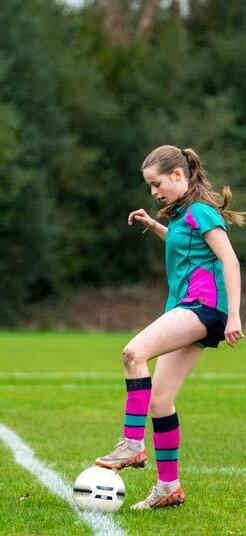
You need to enjoy Science; you will be spending nine lessons per week in Science in Year 10. It is helpful if you are logical and numerate. The specification for each Science includes the material from Combined Science as well as extra content in each Science, eg DNA, structure of the eye, chemical analysis and space. This route uses one of your option choices. There is no practical coursework requirement, but pupils are required to complete set experiments which can be assessed in the written papers.
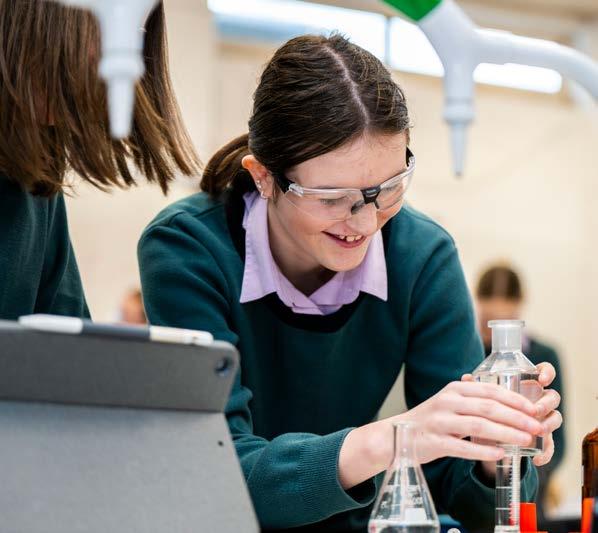
Option Subjects (3 GCSEs):
Biology Course Code: 8461
Chemistry Course Code: 8462
Physics Course Code: 8463
How is it assessed?
• Each Science is assessed in two written papers (ie six in total, for the three GCSEs)

Description Content
Biology
Paper 1
Biology
Paper 2
Chemistry
Paper 1
Chemistry
Paper 2
Physics
Paper 1
Physics
Paper 2
Progression
Biology topics 1 – 4: Cell Biology; Organisation; Infection and response; Bioenergetics (100 marks)
Biology topics 5 – 7: Homeostasis and response; Inheritance, variation and evolution; Ecology (100 marks)
Chemistry topics 1 – 5: Atomic structure and the periodic table; Bonding, structure, and the properties of matter; Quantitative Chemistry; Chemical changes; Energy changes (100 marks)
Chemistry topics 6 – 10: The rate and extent of chemical change; Organic Chemistry; Chemical analysis; Chemistry of the atmosphere; Using resources (100 marks)
Physics topics 1 – 4: Energy; Electricity; Particle model of matter; Atomic structure (100 marks)
Physics topics 5 – 8: Forces; Waves; Magnetism and electromagnetism; Space Physics. (100 marks)
The GCSE examinations in Biology, Chemistry and Physics are an ideal choice for pupils with a particular interest in Science. In our opinion, the Separate Sciences are a good preparation for those pupils who wish to study Science at A level or beyond. However, an able scientist would manage A level successfully from Combined Science.
Careers support work starts in Year 7 and continues throughout the School, and is developed to suit the needs of the different age groups. We have a selection of speakers, including Old Girls, visiting school at times through the ‘ThinkTank’, ‘Insight Into …’ sessions and various PSHEE days to talk about their profession and roles. These give invaluable opportunities to find out about available fields.
The basic objective is to improve awareness and decisionmaking skills linked to higher education and career opportunities. This is achieved with seminars and work done in the PSHEE programme when key decisions have to be taken. Pupils in Years 9, 10, 11 and the Sixth Form, also have the opportunity to attend the Careers’ Fair which is held every two years. The next one takes place in March 2026.
Our Head of Careers works closely with Form Tutors, Heads of Year and subject teachers. She is always available for individual consultations with pupils. We also have a dedicated Careers Hub, which is well stocked with resources, books and prospectuses. If you would like a chat, please email a.west@farnborough-hill.org to arrange a time.
The School works with EC Careers who use a system called Morrisby. All Year 10 pupils take a series of online psychometric assessments in the Summer Term. During the Autumn Term in Year 11, each pupil is then offered an impartial interview with an advisor from EC Careers in order to discuss the results of their profiling and possible compatible careers. The profiling, which is based on the latest thinking in psychometrics, is designed to give an indication of personality type, career interests, abilities, strengths and learning styles which can be useful to the pupils in their personal exploration of future careers as well as adding a real incentive to school work.
All Year 10 pupils are encouraged to take part in this scheme which operates at the end of the academic year. All work experience is valuable and often confirms an idea in an individual’s mind. It is also useful for ruling out careers and can be a great way to help determine your future direction in terms of university and work.
Personal, Social, Health and Economic Education at Key Stage 4
The PSHEE programme aims to promote the spiritual, moral, social, cultural, academic and physical development of each pupil as well as preparing them for the opportunities, responsibilities and experiences of adult life. We aim to help pupils become confident, healthy and responsible, both as individuals and as members of society.
At Farnborough Hill we provide pupils with a framework within which they can develop. The content of this framework enables pupils to build on the skills learnt as part of the KS3 PSHEE programme, and complements the academic curriculum by fostering the core values of self-respect and respect for others.
The Year 10 and Year 11 PSHEE programme involves offtimetable days that aim to help pupils to:
• develop self-knowledge, self-esteem and self-confidence, allowing them to make the most of their abilities
• accept responsibility, show initiative and understand how they can contribute to community life and play an active role in society
• develop positive relationships
• develop a healthy lifestyle, positive mental health and resilience in the face of challenges that they may face in life
• respect differences between people
• develop an understanding of the spiritual, moral, social and cultural issues that face society and the wider world
• develop political and economic awareness
• understand and support fundamental British values

For those who wish to broaden their academic horizons or pursue areas of particular interest in greater depth, there are various opportunities available through our Super-Curricular programme. These include a series of Think Tank and Think Tank Extra talks, both of which are open to all. Whilst the Think Tank talks provide an insight into possible future career pathways, often through discussions led by Farnborough Hill alumnae, the latter offer an opportunity to hear high-profile speakers and experts in their field discuss their latest research and findings.
For those wishing to acquire an additional qualification, there are opportunities to do GCSEs in Classical Greek, Further Mathematics and Modern Foreign Languages outside of the standard timetable. In order to ensure that such additional challenges are manageable, there will be strict entrance requirements for these courses, as well as ongoing monitoring of progress by the relevant departments. Details of how to participate in the Super-Curriculum programme will be sent with the Options and Choices Form.
More informal exploration of particular subject areas is also available through highly-popular activities such as the Model UN (History/Politics) and Young Enterprise (Business).
